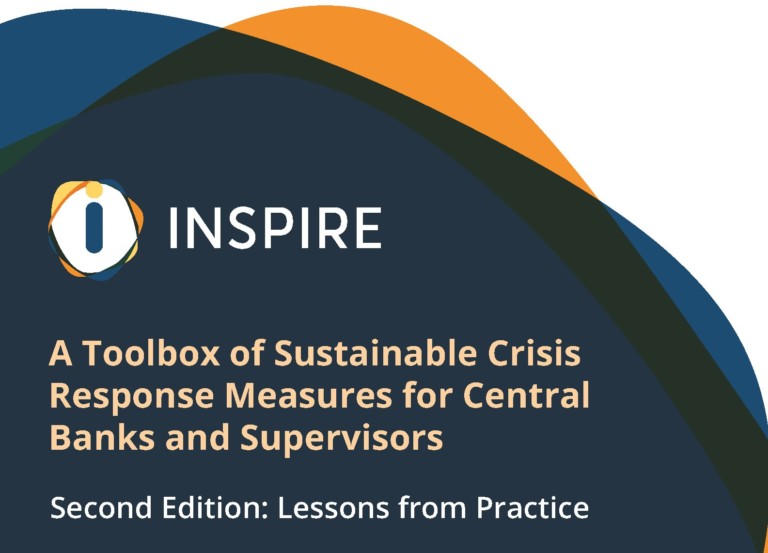Central Banks Miss Out on Opportunities to Deliver a Sustainable Crisis Response

Central banks have so far not made the connection between their substantial COVID response programmes and their deepening commitment to action on climate change, according to a new report published today (November 23rd) by the Grantham Research Institute on Climate Change and the Environment at the London School of Economics and Political Science (LSE) and the Centre for Sustainable Finance at SOAS, University of London.
The report titled, “Lessons from Practice”, is the second edition of the Toolbox of Sustainable Crisis Response Measures. The report also finds that the crisis has not stopped central banks from launching new climate initiatives but it notes that, so far, there has been a divergence between the trillions being delivered in COVID response and long-term sustainability.
The report is the latest publication from the International Networks for Sustainable Finance Policy Insights, Research and Exchange (INSPIRE), which was established to support the 70+ central banks and supervisors that are now part of the Network for Greening the Financial System (NGFS).
“Out of the over 400 central banking and supervisory crisis response policy instruments and adjustments that we looked at in 188 countries, only one explicitly takes sustainability considerations into account. But we also found that central banks and supervisors in 40 economies have taken measures to scale up sustainable finance, but not as part of their crisis response,” said Simon Dikau, a Research Officer at the Grantham Research Institute and a co-author of the report.”
The Toolbox shows why it is so important for central banks to develop a sustainable crisis response to avoid locking in high-carbon assets that could then become stranded as the transition to a net-zero economy accelerates.
“What is missing is not a lack of will, but a perceived absence of practical ways of joining up the prudential and monetary measures taken in response to the crisis and the deepening commitment to greening the financial system. The toolbox serves to fill this gap,” said Nick Robins, Professor in Practice for Sustainable Finance at the Grantham Research Institute, co-chair of INSPIRE and a co-author of the report.
The Toolbox describes how the instruments that are being applied by central banks and financial supervisors in the crisis can be calibrated in ways that account for climate- and other sustainability-related financial risks and contribute to the achievement of climate and sustainability goals.
“Central banks and supervisors ought to do whatever they can, within their mandate, to align their own COVID-19 crisis responses with the Paris climate goals. And there is no question that they have plenty of tools to do just that,” said Ulrich Volz, Director of the Centre for Sustainable Finance and Reader in Economics at SOAS, University of London and a co-author of the report.
The Toolbox contains nine broad tools grouped in three broad areas: monetary policy, financial stability and other. The updated Toolbox contains a broad range of measures and recommends that central banks focus on four key tools in the next phase of crisis response:
- Amending collateral frameworks to account for climate change-related and other environmental risks.
- Removing the carbon bias within corporate asset purchase programmes and align refinancing operations with Paris Agreement goals.
- Adjusting prudential measures to minimise climate risks and strengthen disclosure and stress testing requirements.
- Adopting sustainable and responsible investment principles for portfolio management, including policy portfolios.
In the next phase of research, the team will look in depth at the technical details of their four priority tools to encourage implementation.
Read the report “The Toolbox of Sustainable Crisis Response Measures” (see attached). The link will be live once the embargo has lifted.
For further information and for interview requests please contact Niamh Brannigan at n.brannigan@lse.ac.uk or call +353 870928997
Notes to editors
About the institutions involved
The International Network for Sustainable Financial Policy Insights, Research, and Exchange (INSPIRE) is an independent research network built to support the central banks and supervisors of the Network for Greening the Financial System (NGFS) in its work to manage climate risk and mobilise finance to support the transition to a sustainable economy. The INSPIRE secretariat is co-hosted by the Grantham Research Institute on Climate Change and the Environment and the ClimateWorks Foundation, and is guided by an Advisory Committee who provide domain expertise in close interface with the work priorities of the NGFS. Philanthropic support for INSPIRE is provided by ClimateWorks Foundation. www.climateworks.org/inspire/
The Grantham Research Institute on Climate Change and the Environment was established in 2008 at the London School of Economics and Political Science. The Institute brings together international expertise on economics, as well as finance, geography, the environment, international development and political economy to establish a world-leading centre for policy- relevant research, teaching and training in climate change and the environment. It has an active body of work on sustainable finance, including carbon assessment, central banks, the just transition, resilience and sovereign bonds. It is funded by the Grantham Foundation for the Protection of the Environment, which also funds the Grantham Institute – Climate Change and Environment at Imperial College London. www.lse.ac.uk/grantham/
The Centre for Sustainable Finance at SOAS, University of London aims to advance the transition to an equitable, low-carbon economy by providing a forum for interdisciplinary research and teaching on sustainable finance and investment. It seeks to enhance the knowledge and understanding of sustainable finance in both the Global North and South and act as a focal point for policy debates in this area. www.soas.ac.uk/centre-for-sustainable-finance/

